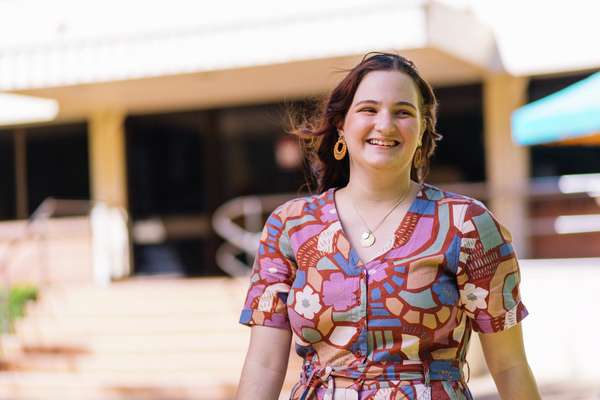
Whether you have always dreamed of being a teacher, or you are now seeking a career change, the Master of Teaching (Primary) is an initial teacher education course suitable if you already hold a non-education three-year bachelor degree and wish to become a primary school teacher.
The Master of Teaching (Primary) will prepare you to demonstrate the Australian Professional Standards for Teachers (Graduate Career Stage) and apply for provisional registration with the administering body in Queensland, the Queensland College of Teachers.
This course enables you to teach across the Australian Curriculum in the Preparatory Year to Year 6 in Australian primary schools.
In addition to building the professional knowledge and skills required to teach, the course is designed to foster dispositions for engaging in and contributing to the teaching profession through a commitment to ongoing professional learning. The Master of Teaching (Primary) includes a specialisation in English, providing you with knowledge and skills in this specialisation area. Plus, you'll complete work-integrated learning in each term of study based on a full-time study load, ensuring you are building real-world skills in the classroom and developing your confidence.
Enjoy the flexibility of studying online anywhere in Australia, with both part-time and full-time options available. If you're starting in Term 1, you have the option to fast-track your studies and utilise CQU's three Terms. If you choose this full-time option, your course can be completed in as little as 18 months.
Change your career with our postgraduate primary teaching degree, offering flexible and heavily discounted study options and the opportunity to fast-track your degree and qualify sooner. Click 'Explore Study Experience' for more information.

I know that having the Masters of Teaching degree is going to be incredibly useful because as we've seen through COVID, it's an essential job and you will never, ever have enough teachers in the world.
Cassidy Acutt
Bachelor of Theatre, Master of Teaching
The Master of Teaching (Primary) is an initial postgraduate pre-service teacher education program for those who aim to pursue a career as a primary school teacher. Graduates are qualified to teach from Foundation (Preparatory) to Year 6.
As a graduate of the program, you can apply for registration with the Queensland College of Teachers and are qualified to teach in State, Catholic and Independent schools throughout Australia.
The program is also recognised as a teaching qualification for employment in educational settings internationally, however additional requirements may apply in some locations.
Graduates of this program have developed significant skills that enhance employment opportunities in other sectors. In combination with work experience and personal qualities, graduates may pursue employment in a variety of career paths, including:
The course structure and available locations can change depending on when you want to study. You can choose the intake that best suits you in the drop-down menu below.
You must complete 17 units (96 credits):
The units you'll study are listed below. Click on a unit to learn more.
To help you plan your studies and see which unit comes first, if one unit should be completed before another and the term you will study each unit, check out our course planners.
Graduates are eligible to apply for provisional registration as a teacher upon completion of the course.
Wider Field Experience as per EDFE20034 Unit Profile
Supervised placement as per EDFE20035 Unit Profile
Supervised placement as per EDFE20036 Unit Profile
Supervised placement as per EDFE20037 Unit Profile
Throughout your course, you will complete 65 days of supervised placement. For students studying full-time, placements are scheduled in each term and allow you to apply your skills and knowledge to real teaching scenarios.
| Term | Professional Praxis Unit and Duration |
| First term | Professional Praxis 1: Understanding learning contexts (EDFE20034)
|
| Second term | Professional Praxis 2: Supportive Learning Environments (EDFE20035)
|
| Third term | Professional Praxis 3: Enacting Learning and Teaching (EDFE20036)*
|
| Final term | Professional Praxis 4: Transition to Teaching (EDFE20037)*
|
*You will need to have met the requirement of "Standard Achieved" in both components of the LANTITE to be eligible to register for these placements.
From July 2025, the Australian Government has established a new Commonwealth Prac Payment (CPP) for eligible students to help manage the costs associated with undertaking a mandatory placement (also known as a practicum or work- integrated learning). Learn more about CPP.
If you have completed prior study relevant to units within this course, you may be eligible for credit for your past studies.
For your application to be considered, you must meet the following entry requirements.
While not needed to apply, you'll need to meet the following requirements throughout your studies.
You must complete both components of the LANTITE with a result of “Standard Achieved” to be eligible for graduation and acquire provisional teacher registration. The LANTITE is administered nationally by the Australian Council of Education Research (ACER) and you must attempt both tests in your first year of study.
The Australian Institute of Teaching and School Leadership (AITSL) permits recognition of First Nations language proficiency by the relevant cultural authority as an acceptable alternative standard to LANTITE. Students who are proficient in an Australian First Nations language can use this as an alternative in place of all LANTITE requirements.
The Indicative First-Year Fee is the approximate cost of enrolling in this course for one full-time academic year (eight units over two terms) depending on the type of place you are offered, for example, a Commonwealth Supported Place (CSP) or Full Fee Paying (FFP) Place. The indicative fee provided should be used as a guide only. Your actual fees may vary depending on the units you select to study and your study load. Check the Cost per Unit spreadsheet available on our Understanding Course Fees webpage.
Fees are reviewed each year and are subject to change. Fee estimates for the following year are expected to be available in September each year.
With Commonwealth Supported Places (CSP) available for this course in 2025, you may be eligible for significant fee savings, provided you meet CSP eligibility requirements. CSPs are subsidised by the Australian Government, meaning you are only required to pay the student contribution rather than full tuition fees.
If you are not eligible for a CSP or if CSPs are full, you will be required to pay full fees.
You may be eligible for a HECS-HELP government loan if you are offered a CSP. HECS-HELP is an Australian Government loan scheme that assists you in paying your student contributions. Provided you meet the HECS-HELP eligibility criteria, you may use HECS-HELP to defer part or all of your student contribution fees.
Learn more about paying for university.
From July 2025, the Australian Government has established a new Commonwealth Prac Payment (CPP) for eligible students to help manage the costs associated with undertaking a mandatory placement (also known as a practicum or work- integrated learning).
Part of your course costs will include Student Services and Amenities Fees (SSAF). SSAF is charged in addition to your student contribution or tuition fees and is used to help enhance your study experience. There may also be other costs as part of your studies, such as textbooks, technology expenses, travel expenses, professional certifications, uniforms, or vaccinations.
We believe a quality education can be for everyone – regardless of background, location, or life circumstances. That's why we offer a variety of scholarships and bursaries that can give you a helping hand with a range of expenses and enhance your employability.
Check what you need to do to apply to study this course.
Learn about the assessment of applications and everything you need to know about receiving and accepting an offer to study with CQU.
When applying through a tertiary admissions centre (TAC) you can use the relevant TAC code below to search for a course or add it to your application preferences.
CQUniversity Australia is a trading name of Central Queensland University
ABN: 39 181 103 288
RTO Code: 40939
CRICOS: 00219C
TEQSA: PRV12073